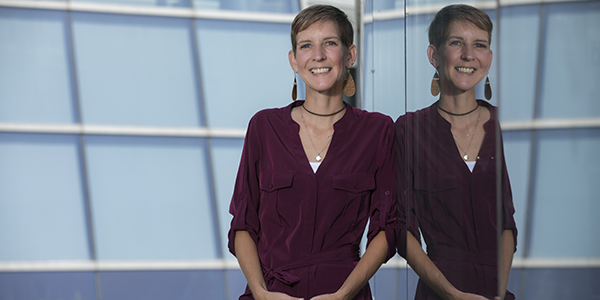Learning to fail through making and tinkering

Encouraging youth to experiment — and fail — through STEM projects in an informal learning space is a powerful experience, according to Amber Simpson, an assistant professor in the Department of Teaching, Learning and Education Leadership in the College of Community and Public Affairs. She has seen this process and the learning that results from it play out over and over in a variety of community-based projects she has spearheaded or been a part of during and prior to her time at Binghamton.
STEM: where failure leads to innovation
Science, technology, engineering and math present a landscape abundant with opportunities to theorize, experiment, fail and then start the process again, Simpson said, especially as these fields increasingly shape the world around us, both in professional spaces and everyday life. That’s why she believes it’s vital to get youth involved in making and tinkering from a young age — and similarly to get future educators accustomed to the learning that can take place outside of a strict curriculum-based environment where failure is so often seen in a negative light.
“It’s important for students interested in education to actually get time out in the community, working with youth in ways that are different than their mandated student teaching experiences in the classroom,” Simpson said.
Making and tinkering outside the classroom
In fall 2018, Simpson offered an academic service-learning class for the first time — her “making and tinkering” class — to get her students into the community. They worked with Your Home Public Library in Johnson City, N.Y., and Windsor Central Middle School to develop projects that would be beneficial to the youth and families connected to these institutions.
Students working with the library developed a project in which they spent one night a week helping youth make remote controls using Makey Makey invention kits — which provide hands-on lessons on circuitry and conductivity — and then building video games using an online program that introduced basic coding. At the middle school, her students came up with similar making and tinkering activities to do during a weekly after-school program in the school’s new makerspace, a converted section of their library. Since that first course, Simpson has introduced similar opportunities for her students through independent study courses and internships.
“It’s almost freeing for them,” said Simpson, “and actually difficult for them, to see learning happening without it being connected to particular concepts. How do you let kids fail and it be okay? How do you step away and allow that to happen? What are really good questions you can ask?
“It’s almost shifting their own mindset of what education can look like, which I find quite valuable,” she added. “But it takes time. It’s really hard for them to start to wrap their heads around the idea that school could actually be like this.
“I remember one student in particular talking about his comfort now with failure, how failure is such a negative thing in his classwork here. Seeing that through an informal learning space really helped him to refocus his notion of what failure means for him.”
Online engagement: families making and tinkering during a pandemic
This past summer, Simpson experimented with making and tinkering in an online world. “How do we support STEM learning and engagement with families during a pandemic?” she asked herself. She started an online summer camp with five local families with youths in grades two through six, based on engineering using everyday objects, and particularly objects that might otherwise be thrown away.
Simpson gave the families an engineering task, and let them spend time together thinking up creative ways to solve the problem. Eventually, she let the students come up with their own problems to solve: one student worked on a face mask that wouldn’t fog up glasses and would allow the wearer to easily drink through a straw; another student created a stable, easy-to-clean table that would attach to the favorite chair of her grandfather, who suffers from Parkinson’s Disease; a third student built a playground for squirrels to keep them distracted and out of the family’s garden.
Simpson added some fun to this final project by creating a virtual Shark Tank scenario, with two fictitious investors who would decide which projects to fund. The families also got “money” they could choose to invest in each other’s ideas.
“If you can allow youth to express that interest in STEM early and maintain and foster that through the home environment, they’re more likely to enter a STEM field,” said Simpson. “Family engagement just doesn’t happen as much as we think, because families are running around so much. Now [during the pandemic] they’re not so much, so trying to build that sense of family community — it’s important.”
